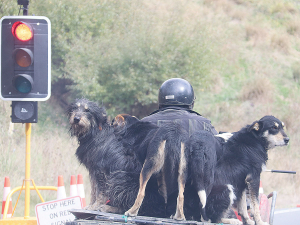M.I.A.
OPINION: The previous government spent too much during the Covid-19 pandemic, despite warnings from officials, according to a briefing released by the Treasury.
 Connectedness and belonging helped people in rural communities stay positive over the Covid-19 pandemic.
Connectedness and belonging helped people in rural communities stay positive over the Covid-19 pandemic.
According to the recently released Te Hiringa Mahara Mental Health and Wellbeing Commission report, the impact of Covid-19 has added additional stress to the wellbeing of rural communities in New Zealand.
Around 16% of the country's population live in rural areas and around 35% in total live outside of large urban areas, with higher figures for Māori. The Covid-19 pandemic has had large impacts on these communities, exacerbating pre-existing challenges across healthcare services as well as highlighting and compounding stress farmers and growers were already experiencing.
Te Hiringa Mahara director of wellbeing system leadership and insights Dr Filipo Katavake-McGrath said the geographies, economies and cultures of rural communities present challenges to mental health and wellbeing outcomes.
"This is particularly true with respect to isolation and connectivity, workforce challenges in the economy and health services and uncertainty in rural economies."
Poor connectivity meant more people were struggling to get help, advice and support; with older people even less likely to be online, the closure of social hubs such as schools and libraries during lockdowns also had large impacts on communities.
McGrath says the report highlights the challenges presented to the rural community by these issues and with a higher rural population rural issues were disproportionately affecting Māori.
"It is important to remember that life has not 'returned to normal' and the need for support has not gone away. On a positive note, connectedness and belonging have helped people in rural communities stay positive over the Covid-19 pandemic. Strong local connections are a source of strength and support; and this is highlighted in rural Māori and Pacific communities."
During lockdowns, iwi, marae, communities banded together to support one another; share information, food and resources and reduce some of the worst psychological impacts of the pandemic.
"By working together, and engaging with government agencies and resources, rural communities have taken practical action to protect and support themselves. To keep the momentum going, we call for greater involvement of rural communities (particularly rural Māori) in planning and decision-making and better understanding of the diverse needs, challenges and experiences of rural communities."
Associate Agriculture Minister and Manawatu dairy farmer Andrew Hoggard says the free trade agreement (FTA) negotiated with India is not a bad deal and his party, Act, will support it when it goes before Parliament.
Newly released data from Environment Canterbury (ECan) Farm Environment Plan (FEP) audits are showing a dramatic lift in environmental performance across the region.
A solid recovery of global dairy prices this year makes a $9.50/kgMS milk price almost a shoo-in for this season.
As New Zealand marks the United Nations’ International Year of the Woman Farmer 2026 (IYWF 2026), industry leaders are challenging the misconception that women only support farming.
Fonterra’s impending exit from the Australian dairy industry is a major event but the story doesn’t change too much for farmers.
Expect greater collaboration between Massey University’s school of Agriculture and Environment and Ireland’s leading agriculture university, the University College of Dublin (UCD), in the future.

OPINION: Here w go: the election date is set for November 7 and the politicians are out of the gate…
OPINION: ECan data was released a few days ago showing Canterbury farmers have made “giant strides on environmental performance”.